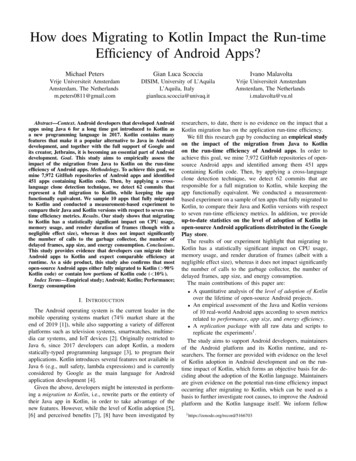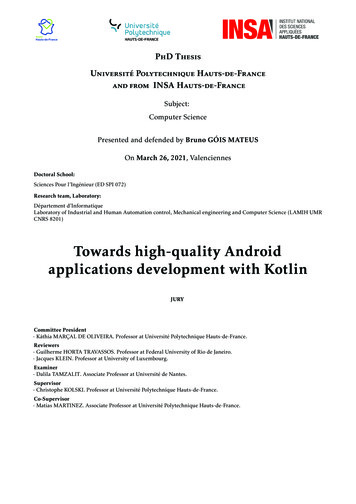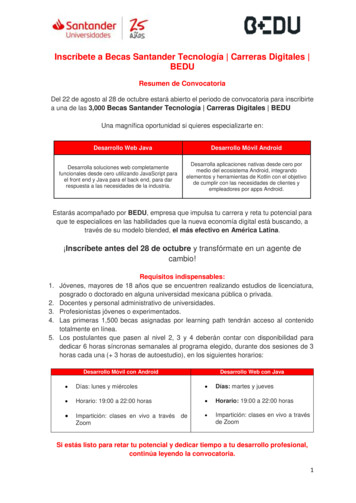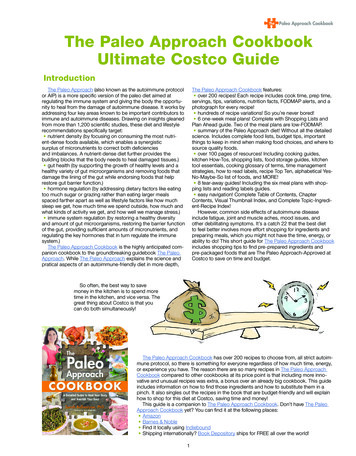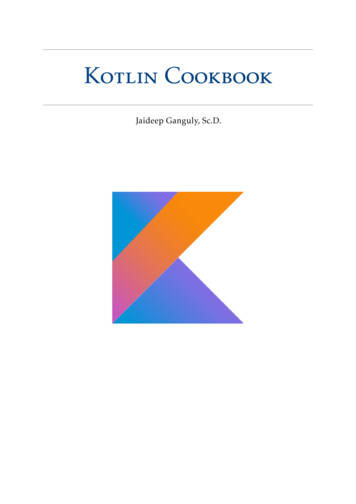
Transcription
Kotlin CookbookJaideep Ganguly, Sc.D.
Co n t e n t siContentsPrefaceiii Basic Structure . Class & Function . Null Check Class, Inheritance, Interface . Class . Inheritance . inheritance & Interface . Inheritance & Interface . data class . object . enum class . Delegation . Generic . Lazy Init Condition & Loop . Condition . for . while LAMBDA FUNCTION . Lambda Function HIGHER ORDER FUNCTION . Higher Order Function EXTENSION FUNCTION . Extension Function . apply,also,run,let . data class COLLECTION . Array . Array of fixed size . List . Mutalble List . Set . Slicing . Map . Mutate Collection . Closure . filter a list . filter a map . fold & reduce . data class i
iiconten t s GENERIC . Generic CONCURRENCY . Concurrency . Suspending Function . Blocking Function . Run on another thread but still blocking the main thread . Run blocking with custom dispatcher . Async . Serial . Long running function DATABASE . CRUD . Connect . Select . Create, Update & Delete Utility Functions . Utility Functions Main . Main Output . output Index
P r e f ac eThis book has been written to help Java developers migrate to Kotlin easily. A Java developershould be able to migrate to Kotlin and be reasonably proficient in a day. The IntelliJ IDE fromJetBrains, creators of Kotlin, should be used to develop in Kotlin.The Object Oriented Programming (OOP) paradigm mostly often results in obfuscating codeusing a plethora of classes, sub-classes and interfaces that add levels of abstraction but no value.The code follows a verbose, iterative, if-then style to encode business logic. For a piece of codewith business logic of just lines, it is not unusual to see developers write lines in formof Interface, Abstract Classes, Concrete Classes, Factories, Abstract Factories, Builders andManagers. Making changes has become tedious, time consuming and error prone. Most of theassumptions around the need for extensibility is false and much of the code written for the sakeof extensibility is never used.Kotlin, a next generation language, helps eliminate verbose iterative and if-then style of codingand replace it with simple, terse and easily readable code using a functional style throughthe use of collections, filters, lambdas and maps. One can rely on static objects and use extensionfunctions whenever required. However, Kotlin also allows you to write in the OOP style.Kotlin inter-operates well with the Java based ecosystem in which we have heavy investments.It is easy to write high performant non-blocking, asynchronous, event driven code in half thesize or even lesser than comparable Java code. It is easy to use its language constructs andwrite smaller code which removes null-checks, loops, branches and other boiler-plate code,leaving developers to focus on business logic than on repeated boilerplate code. Using Kotlin asa development language is a shift towards the right direction. An added benefit is that it willreduce our hardware costs. It learns from modern languages like C#, GO, Python and Ruby,and plugs in concepts in JVM ecosystem never seen before, and that too, in a highly intuitiveand a smooth learning curve. Kotlin is the language of choice for Android development and isofficially endorsed by Google.iii
chapter1Ba s i c St ru c t ure . Class & FunctionListing . – Class & Function. package template // A class can be stand alone, outside any functionfun mytest(x: Int): Int {var x: Int 3x 4println("The value of x x")return 1} /* modifiers are on class, not allowed on variables in functionspublic is used by default, which means that your declarations will bevisible everywhere;internal - visible everywhere in the same module, eg.kotlin templateprivate - visible inside the file containing the declaration;protected - strictly accessible only by declaring class \& subclasses.Note: to use a visible top-level declaration from another package,you should still import it. */internal class BasicStruct() { fun foo(x: Int, y: Int): Unit { // Type inferenceval z 10// Explicit type declarationval zz: Int 12 // String interpolationprintln("sum of x and y is {x y}") // Smart castsif (z is Int)println(" z is Int") // Class (z::class.qualifiedName.toString()) } fun foo(letter: Char) {println(letter)} fun foo(letter: Char, num: Int,area: Float 10.0f, name: String "Josh") {// -s makes it left flush, else right flushprintln("%c %2d %.2f %-8s".format(letter,num,area,name))}
chapter . basic structu r e . Null CheckListing . – Null Check.fun fooNull() {var a: String "abc"var b: String? null//a null // will not compile if uncommented; null check if (b?.length null)println("b is null") // safe call, evaluates to null; no NPE //////////////} try {if (b!!.length null)println("null")}catch (e: Exception) {e.printStackTrace()}}
chapter2C l a s s , I n h e r i tance, Interface . Class Listing . – Class./* www.callicoder.com/kotlin-inheritance/In Kotlin, get(), set() are auto-generated, no need need to create etters#introduction */package template class A(val id: Int) {var name: String "" // Note: id not required to be instance variablevar test: Float 0.0f // id instance variable, will cause compile error constructor(id: Int, name: String): this(id) {this.name name} init {test 0.0f // test not passed in constructor, no need for function} } . Inheritance Listing . – Inheritance.class Foo3(name: String, num: Int, city: String, state: String):Foo2(name,num,city) {} . inheritance & Interface Listing . – Inheritance & Interface.open class Foo2: Foo, IFoo {var city: String ""// A class has a primary constructor and multiple secondary constructorsconstructor(name: String, num: Int, city: String): super(name, num) {this.city city} init { println("In Foo2") } // initialization code override fun sum(x: Int, y: Int): Int { // override must for extendingreturn(x-y)} fun mult(x: Int, y: Int): Int {return(x*y)} override fun f1(): String {println("In f1")return("f1")} }
chapter . class, inheritance, interfac e . Inheritance & Interface Listing . – Inheritance & Interface.open class Foo(name: String, age: Int) { // default final, open extendiblevar name: String ""var age: Int 0var msg: String ""var id:Int 0 // constructor cannot contain codeconstructor(name: String, age: Int, msg: String): this(name,age) {println("Secondary constructor of base class Foo: name age msg")this.name namethis.age agethis.msg msg} init { // initilization codeid 1000println("In init of base class:id " this.id)} open fun sum (x: Int, y: Int): Int {return x y this.id} } interface IFoo {fun f1(): String} . data class Listing . – data class.// Data Classdata class Person(var name:String,var age:Int,var gender: Char) . object Listing . – object.object ObjectExample {fun hello(): String {return "hello from singleton object"}} . enum class Listing . – enum class./* h enum constant is an object. Enum constants are separated by commas.Each enum is an instance of the enum class, e.g., initialized as: */enum class ColorEnum(val colorCode: Int) { //val c 212),Orange(212121)}
. . d e l e g ation . DelegationListing . – Delegation. // Delegationinterface IBase {fun print()} class BaseImpl(val x: Int): IBase {override fun print() { print(x) }} class Derived(b: IBase): IBase by b /* You can declare a class as the delegation of another classto make callable for all the methods of it. *//*interface A { . }class B: A { }val b B()// initiate C, and delegate all methods of B defined in Aclass C: A by b*/ . GenericListing . – Generic. class test2 T { // Will not compile if T is removed from class definitionfun tt(x: T) {println("Testing compilation in generics")}} . Lazy InitListing . – Lazy Init. // medium.com/@mohitsharma -9e5f01c561dc// Lazy Initval test: String by lazy {val testString "some value"testString // must be last line as in lambda expression and is returned} fun doSomething() {println("Length of string is " test.length)
chapterCo n d i t i o n & Loop . ConditionListing . – Condition. package template internal class Logic() { fun foo (letter: Char) {println(letter)} fun foo (letter: Char, num: Int, area: Float 100.00f,name: String "Josh") {// -s for left flush, else right flushprintln("%c %2d %.2f %-8s".format(letter,num,area,name))} fun foo(name: String) { if (name.compareTo("Josh") 0) {println("I am Josh")}else if (name.compareTo("Tua") 0) {println("I am Tua")}else {println("I am somebody")} when(name) {// if satisfied, next conditions will not be evaluatedis String- {println("Josh is a string")}"Josh"- {println("Hello Mr. name")}"Tua"- {println("Hello Ms. name")}else- {println("Good Morning")}} } 3
chapter . condition & lo o p . forListing . – for.fun forloop() { forforforfor (i(i(i(iinininin1.10) { println(i) }0 until 10) { println(i) }2.10 step 2) { println(i) }10 downTo 1) { println(i) } for (i in 1.10) {if (i in 5.8 step 2)print(" i ")} } . whileListing . – while.fun whileloop() {var i 0while(true) {println("val i")i if (i 10)break}} }
chapter4L A M B DA F U NCTION . Lambda FunctionListing . – Lambda Function. package template /* Kotlin functions are first-class or higher order functions i.e.,they can be stored in variables and data structures, passed asarguments to and returned from other higher-order functions. */class LambFun() { fun example(x: Int, y: Int, name: String) { val lambfunc1: (Int, Int) - Int { x, y - x y }// val lambfunc1 { x: Int, y: Int - x y } // type inferencevar test add(21,23,lambfunc1)println("Adding: {test}") val lambfunc2: (String, Int, Int) - Int {s, a, b - println("1: {s}")var x a bprintln("2: a b")x // last line is returned}hof("Hello", lambfunc2, "Hello2") // Alternate syntax, lambda function is the last parameter in { }hof("Hello") {s, a, b - println("1: {s}")var x a bprintln("2: a b")a b // last line is returned} } fun add(a: Int, b: Int, lambfun: (Int, Int) - Int) : Int {val x lambfun(a,b)println(x)return x;} fun hof(msg: String, lf: (String, Int, Int) - Int, m: String "ok") {println("msg {msg}")val result lf("Josh", 2, 3) // Invoke the lambda with argumentsprintln("result is result")} fun hof( msg: String, lf: (String, Int, Int) - Int) {println("msg {msg}")val result lf("Josh", 2, 3) // Invoke the lambda with argumentsprintln("result is result")} }
chapterH I G H E R O R D ER FUNCTION . Higher Order FunctionListing . – Higher Order Function. package template /* Kotlin functions are first-class or higher order functions i.e.,they can be stored in variables and data structures, passed asarguments to and returned from other higher-order functions. */class HOF() { fun example(msg: String, name: String) {foo(msg,name,this::bar) // this or instance of class} fun foo(msg: String, name: String, op: (String) - Unit) {print(" {msg} ")op(name)} fun bar(name: String) {println(" {name}!")} } 5
chapter6E X TE N S I O N FUNCTION . Extension FunctionListing . – Extension Function. package template /* Extend a class with new functionality without having to inherit fromthe class or use any type of design pattern such as Decorator.This is done via special declarations called extensions. To declarean extension function, we need to prefix its name with a receiver type,i.e. the type being extended. */ // add a swap function to MutableList Int :fun MutableList Int .swap(index1: Int, index2: Int) {val tmp this[index1] // ’this’ corresponds to the listthis[index1] this[index2]this[index2] tmp}
chapter . extension functio n . apply,also,run,letListing . – apply,also,run,let. fun testApply() {var per Pers("Tim",22)var per2 Pers("Tim",24) // No need to return self, No need for null check; No this receivedrun {if (per.age 20)perelseper2}.printPer() // this receivedwith(per) {per}.printPer() // No need to return self, need null check; send this as argumentper?.run {age 1} // send itper?.let {it - it.age 1} /* returns self, i.e., thissend this */per?.apply {age 1}.printPer() // send itval per9 per?.also { it - it.age 1}.printPer() per?.apply {this.age this.age 10}.printPer() } . data classListing . – data class. data class Pers(var name: String, var age: Int) {fun printPer() {println(this.toString())}}
chapter7CO L L E C T I O N . ArrayListing . – Array. package template class Coll() { fun collect() {// TYPESIZE// ArrayFixed// ListFlexibleMUTABLEYesNo var col1 arrayOf String ("India", "USA", "China", "Australia")col1.plus("Nepal")col1.set(3, "New Zealand")println(col1.get(3))for (x in col1)println(x) col1 "Nepal"for (x in col1)println(x) . Array of fixed sizeListing . – Array of fixed size.var tmp2: Array String Array(10) { it - "" }val emptyStringArray arrayOf String () var x: Array Int Array(5) { it - 0 }var y: ArrayList Int ArrayList() . List Listing . – List.var col2 listOf("Banana", "Kiwifruit", "Mango", "Apple")col2 "Grape"println(col2) . Mutalble List Listing . – Mutable List.col2 mutableListOf String icot")col2.remove("Banana")println(col2) var coll mutableListOf String ("Banana", "Mango", "Apple")
chapter . collectio n . SetListing . – Set.val col3 mutableSetOf String ("Lion", "Cat", "Hippo", "Hippo")col3.add("Dog")// Add an element to the setcol3.remove("Python")// Remove a existing element from a setprintln(col3)// Notice "Hippo" occurs only once . SlicingListing . – Slicing.var colslice col1.slice(0.2)colslice col1.slice((1) until 2) . Map Listing . – Map.// Map has infix style f(10) is represented as f to 10// www.callicoder.com/kotlin-infix-notation/// inline - function call is substituted by function bodyval col4 mutableMapOf("CHCH" to 50000, "GIS" to 36100)col4["DUN"] 118500// Add an entry to the mapcol4["CHCH"] 389700// Change an existing entry in the mapcol4.remove("GIS")// Remove an entry from the map by key for ((key, value) in col4) {println(" key value")} . Mutate Collection Listing . – Mutate Collection.// To mutate a collection, you MUST use the iterator objectvar iter coll.listIterator()while (iter.hasNext()) {var item iter.next() if (item "Banana")iter.remove() if (item "Kiwifruit") {iter.remove()iter.add("KiwiFruits")} if (item "Mango")iter.add("Guava") }println(coll) . Closure Listing . – Mutate Collection./* A closure is a function that carries an implicit binding to allthe variables referenced within it.Note that sum is available inside the lambda function */var sum 0var ints listOf(1, 2, 3, 4)ints.filter { it 0 }.forEach {sum it}println(sum)
. . f i lt e r a list . filter a listListing . – Filter a list.col2.filter { it.startsWith(’A’, ignoreCase true) }.sortedBy { it }println(col2) // Movievar m1 val m2 val m3 val m4 val m5 Movie("Ben Hur",Movie("Quo f)8.5f) var mlMovie mutableListOf Movie ovie.add(m4)mlMovie.add(m5) val mlname mutableListOf String ("Ben Hur", "Quo Vadis","Avenger", "Patton", "Interstellar") var fmlkey mlMovie.filter { it.genre "SciFi"}.map { it.genre }.toSet() var fml mlMovie.filter { ((it.genre "SciFi") (it.genre "Historical")) }.filter { it.genre in fmlkey}.filter { it.rating 8.0 }.map { it.genre }.sorted().toSet()// returns the movie genre only and as a setprintln(fml) . filter a mapListing . – Filter a map.var m mutableMapOf String, Any ()var t mutableListOf Map String, Any ()m["id"] 101m["name"] "Jaideep"m["status"] truet.add(m) m mutableMapOf String, Any ()m["id"] 102m["name"] "Josh"m["status"] truet.add(m) var tmp t.filter { it - ( it["name"] "Jaideep" ) &&( it["id"] 101 )}var tmp3 t.filter { (it["id"] as Int 100) } println(tmp) println((tmp[0]).get("status"))println((tmp[0] as Map String, Any ).get("status"))
. chapter . collectio nfold & reduceListing . – fold & reduce./* fold does the same thing as reduce.fold takes an explicit initial value whereas,reduce uses the 1st element from the list as the initial value.*/val total listOf(1, 2, 3, 4, 5).fold(0,{ total, next - total next })println("total: " total) var mul listOf(1, 2, 3, 4, 5).reduce({ mul, next - mul * next })println("mul: " mul) } } . data classListing . – data class. public data class Movie(val name: String, val genre: String, val views: Int,val rating: Float) public data class Per(val name: String, val age: Int, val genre: String)
chapter8GENERIC . GenericListing . – Generic. /* The class is a template for an object butBox is a class, while Box Int , Box A ,generated by generic class Box. Note thatdo not have a class or interface but theyconcrete object have a type.Box List String are typesprimitives and arrays in Javaare types.*/ /* aeldung.com/kotlin-generics */ package template class ParameterizedClass T (private val value: T) {fun getValue(): T {return value}} // Covariantclass ParameterizedProducer out T (private val value: T) {fun getValue(): T {return value}} // Contravariantclass ParameterizedConsumer in T {fun toString(value: T): String {return value.toString()}} class GenFunClass { init {} fun genFun(t: T) {println(t)} fun T: Comparable in T genFun(t: T) {} } data class T(val id: Int, val name: String)
chapterCO N C U R R E N CY . ConcurrencyListing . – Concurrency. /* -suspendingcoroutines-d33e11bf4761*/ package template import kotlinx.coroutines.* import java.util.concurrent.ExecutorServiceimport java.util.concurrent.Executors val t0 System.currentTimeMillis()private val executorService Executors.newWorkStealingPool(100)val dispatcher executorService.asCoroutineDispatcher() private fun printMemory() {GlobalScope.launch {while (true) {println("Memory used: " " {(Runtime.getRuntime().totalMemory() Runtime.getRuntime().freeMemory()) /1024 / 1024} MB")delay(1000);}}} . Suspending FunctionListing . – Suspending Function. suspend fun printlnDelayed(message: String) {// Complex calculationdelay(3000)println(message)} . Blocking FunctionListing . – Blocking Function. fun exampleBlocking() runBlocking ") 9
chapter . concurren c y . Run on another thread but still blocking the main threadListing . – Run on another thread but still blocking the main thread. fun s.Default) {println("one - from thread {Thread.currentThread().name}")printlnDelayed("two - from thread {Thread.currentThread().name}")}/* Outside of runBlocking to show thatit’s running in the blocked main thread */println("three - from thread {Thread.currentThread().name}")// It still runs only after the runBlocking is fully executed. . Run blocking with custom dispatcherListing . – Run blocking with custom dispatcher. /* runBlocking, customDispatcher, no need for job.join()but need to shutdown customDispatcher */fun exampleLaunchCoroutineScope() runBlocking {println("one - from thread {Thread.currentThread().name}") val customDispatcher her()launch(customDispatcher) {printlnDelayed("two - from thread {Thread.currentThread().name}")var cht1 longCompute(10)println(cht1)var cht2 longCompute(20)println(cht2)} println("three - from thread {Thread.currentThread().name}") (customDispatcher.executor as ExecutorService).shutdown() }
. . a s y n c . AsyncListing . – Async. fun parallel() runBlocking {val startTime System.currentTimeMillis() val deferred1 async { longCompute(10) }val deferred2 async { longCompute(20) }val deferred3 async { longCompute(30) } val sum deferred1.await() deferred2.await() deferred3.await()println("async/await result sum") val endTime System.currentTimeMillis()println("Time taken: {endTime - startTime}") } . SerialListing . – Serial. fun serial() runBlocking {val startTime System.currentTimeMillis() val result1 withContext(Dispatchers.Default) { longCompute(10) }val result2 withContext(Dispatchers.Default) { longCompute(20) }val result3 withContext(Dispatchers.Default) { longCompute(30) } val sum result1 result2 result3println("async/await result sum") val endTime System.currentTimeMillis()println("Time taken: {endTime - startTime}") } . Long running functionListing . – Long running function. suspend fun longCompute(startNum: Long): Long {delay(startNum*100)println(startNum)return startNum * 100}
chapter10DATA BA S E . CRUDListing . – CRUD. // ep Ganguly@since03/20/2018*/ package template rties object ServerDB { internal var conn :Connection? nullinternal var username "root" // provide the usernameinternal var password "root" // provide the password . ConnectListing . – Connect.fun getConnection() { val connectionProps Properties()connectionProps.put("user", username)connectionProps.put("password", password)println(connectionProps) // try e()conn DriverManager.getConnection("jdbc:" "mysql" "://" "127.0.0.1" ":" "3306" "/" "",connectionProps)println("DB connection opened")} catch (ex :SQLException) {// handle any errorsex.printStackTrace()} catch (ex :Exception) {// handle any errorsex.printStackTrace()} }
. chapter . databa s eSelectListing . – Select.fun select(sql: String, typ: String): JSONObject { // var acol var colName: Array String Array( acol.size, { it - " " })for (i in 0.acol.size-1) {colName.set(i,acol[i].trim(’ ’))println(colName.get(i))} var atyp typ.split(",")var colTyp Array(atyp.size, {i - ""}) for (i in 0 . colTyp.size-1) {colTyp.set(i,atyp[i].trim())} var stmt:Statement? nullvar resultset: ResultSet? null var jsonArray JSONArray() var ncol 0var nrow 0 try {stmt conn!!.createStatement() stmt.execute(sql)resultset stmt.resultSetval rsmd :ResultSetMetaData resultset!!.metaDatancol rsmd.columnCountval col arrayOfNulls Any (ncol) while (resultset!!.next()) { var jsonObj JSONObject() for (i in 0.(ncol - 1)) {if (colTyp.get(i).compareTo("Int") 0) {col[i] resultset.getInt(i 1).toString()}else if (colTyp.get(i).compareTo("String") 0) {col[i] resultset.getString(i 1).toString()}else if (colTyp.get(i).compareTo("Float") 0) {col[i] resultset.getFloat(i 1).toString()}else if (colTyp.get(i).compareTo("Date") 0) {col[i] resultset.getDate(i 1).toString()}} for (j in 0.(ncol - 1)) {jsonObj.put(colName.get(j), col.get(j))jsonObj.put(j.toString(), col.get(j))} // jsonArray.add(jsonObj)nrow }
. . s e l e c t } catch (ex: SQLException) { // handle any errorsex.printStackTrace()}finally {// release resourcesif (resultset ! null) {try {stmt?.close()resultset.close()} catch (sqlEx: SQLException) {sqlEx.printStackTrace()} resultset null } if (stmt ! null) {try {stmt.close()}catch (sqlEx: SQLException) {sqlEx.printStackTrace()} stmt null } /*if (conn ! null) {try {conn!!.close()}catch (sqlEx :SQLException) {sqlEx.printStackTrace()} conn null }*/ } // Total Countvar sqltot sql.split("LIMIT")[0]stmt conn!!.createStatement()if (stmt!!.execute(sqltot)) {resultset stmt.resultSet}var ntot 0while (resultset!!.next()) {ntot } var jsonObj s",jsonArray) // DEBUGUtil.log(sql)Util.log(jsonObj.toString() ’\n’) //// return(jsonObj) }
. chapter . databa s eCreate, Update & DeleteListing . – Create, Update & Delete.fun crud(sql: String): JSONObject { var stmt: Statement? nullvar jsonObj JSONObject()try {stmt ut("nins",1)}catch (ex: SQLException) {ex.printStackTrace()jsonObj.put("nins",0)} // DEBUGUtil.log(sql)Util.log(jsonObj.toString() ’\n’)return(jsonObj) } }
chapter11U t i l i t y Fu n c tions . Utility FunctionsListing . – Utility Functions. package template ang.Exceptiontemplate.Util.log object Util { var fw xt") // logfun log(str: String) {fw.appendText(str "\n")} // Fuel.postfun post (url: String, jobj: String ): String {val (request, response, result) Fuel.post(url).appendHeader("Content-Type", () val (payload, error) result // Error handling can be improvederror?.message?.let { println(it) } return response.body().asString("application/json") } // replace only the exact match within the "." delimitersfun replace(str: String, toReplace: String) {val regex "\\b {toReplace.replace(".", "\\.")}\\b".toRegex()// Super important line of code//var newstr str.replace("\\s ".toRegex()," ")println(str.replace(regex, toReplace))} }
chapterMain . MainListing . – Main. println("***template 1***")mytest(3)val bs )println() // template 2println("***template 2***")val a A(10)println(a.id)val a2 A(10,"Josh")println(a2.name)val foo Foo("Josh",24)println(foo.name)//readLine()val foo3 ello()//readLine() // template 3println("***template 3***")val bl Logic()bl.foo("Josh")val s ()bl.whileloop()println() // template 4println("***template 4***")val c Coll()c.collect()println() // template 5println("***template 5***")println() // template 6println("***template 6***")val hof HOF() 12
chapter . ma i nhof.example("Hi","Josh")println() // template 7println("***template 7***")testApply()println()//readLine() // template 8// **template 8***")// Covariantval pp1 ParameterizedProducer(302.33)// doubleval pp2: ParameterizedProducer Number pp1 // assigned to supertype numberprintln("Generic Out:" pp2.getValue()) // Contravariantval pp3 ParameterizedConsumer Number ()// Super class Numberval pp4: ParameterizedConsumer Double pp3 // assigned to subtype Doubleval pp5: String pp4.toString(3.45)println("Generic In:" pp5.toString())println() // template 9println("***template exampleLaunchCoroutineScope()parallel()serial() }
chapter13Output . output/Library/Java/JavaVirtualMachines/jdk1.8.0 202.jdk/Contents/Home/bin/java "-javaHello World!***template 1***The value of x 4sum of x and y is 710 is IntIntkotlin.Intcb is null***template 2***10JoshIn init of base class:id 1000In init of base class:id 1000In Foo2***template 3***I am JoshJosh is a stringGosh1234567891001234567
89246810109876543215 7valvalvalvalvalvalvalvalvalvalchapter . outpu tval 0 1 2 3 4 5 6 7 8 9 10***template 4***New ZealandIndiaUSAChinaNew ZealandIndiaUSAChinaNew ZealandNepal[Banana, Kiwifruit, Mango, Apple, Grape][Apple, Apricot][Lion, Cat, Hippo, Dog]CHCH 389700DUN 118500[Mango, Guava, Apple]10[Apple, Apricot][SciFi][{id 101, name Jaideep, status t
This book has been written to help Java developers migrate to Kotlin easily. A Java developer should be able to migrate to Kotlin and be reasonably proficient in a day. The IntelliJ IDE from JetBrains, creators of Kotlin, should be used to develop in Kotlin. The Object Oriented Programming (OOP) paradigm mostly often results in obfuscating code





